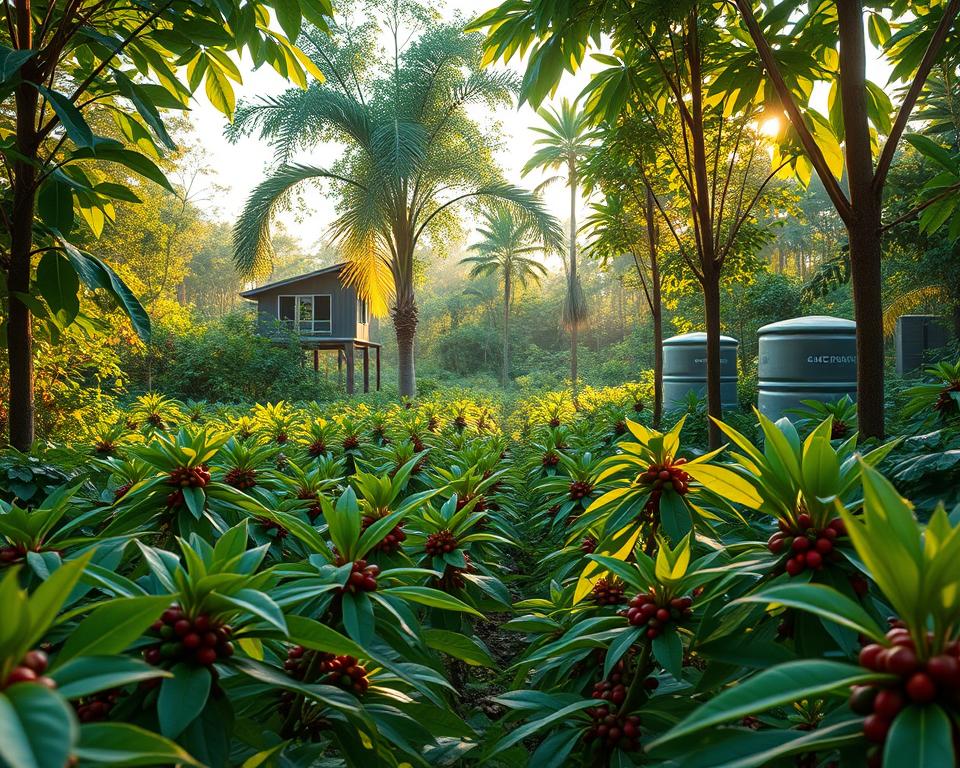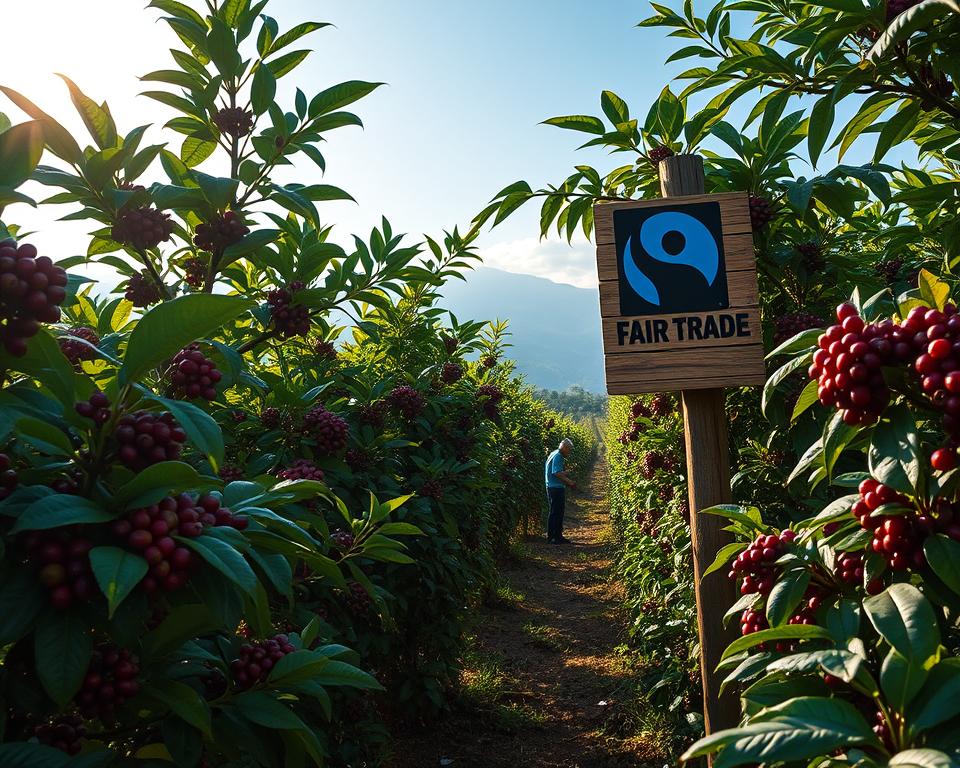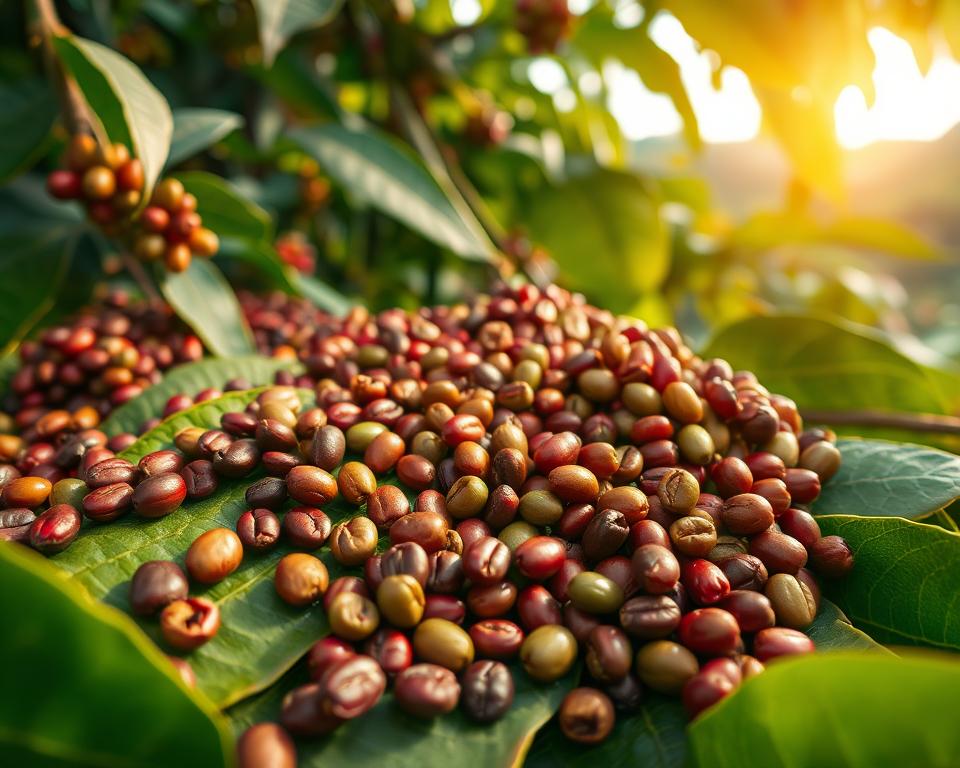In the US, 67% of adults drank coffee yesterday, making it more popular than even water. With International Coffee Day and Fair Trade Month in mind, we ponder the importance of the farmers’ role. By picking Fair Trade Certified™ coffee, we ensure these hard workers get proper pay and help their communities.
Groups like Fair Trade Certified have helped farmers and workers worldwide by giving over $1 billion in benefits since 1998. Knowing how our buying choices can help is key. Companies such as Equator, Two Rivers Coffee, Death Wish Coffee, and Green Mountain Coffee Roasters show their commitment through ethically sourced coffee.
Our choices can drive the push for green coffee bean sourcing. By buying from these brands and saving resources, we promote better methods. Small choices, like eco-friendly packaging, can lead to big changes.
Certification programs like USDA NOP Certified Organic and others have expanded, making sure coffee meets certain standards. The growing want for these coffees encourages fair and direct trade efforts. Though getting certified can be hard for small producers, the push for sustainable coffee practices is strong.
Enjoying our coffee means recognizing the need for ongoing improvements in ethical and sustainable standards. These efforts boost farmers and improve community living standards through fair trade. By choosing sustainable coffee beans, we impact the world positively, one cup at a time.
Understanding Sustainable Coffee Beans
Sustainable coffee sourcing aims to lessen environmental harm and boost the well-being of coffee-growing areas. This method makes sure coffee production is friendly to the planet, with fair work conditions and benefits for the community.

What Does Sustainable Mean?
Sustainable coffee means taking steps to cut environmental effects. Practices like shade-grown coffee protect natural spaces and help many types of life flourish. They also help keep the soil healthy and save water. This fits with larger organic farming ideas. Partnerships with organizations like the Rainforest Alliance and 4C Services check if sustainability goals are reached.
Why is Sustainable Coffee Important?
Sustainable coffee is crucial. It pushes for justice by making sure farmers get fair pay and work in good conditions. Using eco-friendly ways also lessens harm to our planet. It tackles issues like cutting waste and saving different species. When we pick fair trade products, we help farmers earn more. This makes the world coffee market fairer for everyone.
Buying coffee with a focus on sustainability means choosing responsibly sourced products. It supports programs that help small farmers grow. These efforts not only teach better farming methods but also ensure higher pay for top-quality coffee. This boosts the livelihood of farmers overall.
Recognizing Fair Trade Certification
Fair Trade Certification is crucial in the coffee world. It ensures coffee farmers get paid fairly for their work. This certification also highlights the importance of getting coffee the right way. It leads to better community development and working conditions for farmers.

The Role of Fair Trade in Ethical Coffee
Fair Trade coffee certification is managed by organizations like Fair Trade USA and Fairtrade America. They make sure farmers get fair wages and work in good conditions. They also focus on helping the community. Fair Trade USA talks with coffee industry people to support the need for stable prices. This helps the market stay steady.
By setting minimum fair trade prices, they protect farmers from the ups and downs of the market. This makes sure that getting coffee ethically stays important.
Benefits of Fair Trade Coffee
Choosing Fair Trade coffee comes with many good points:
- Empowerment and Compensation: It means farmers are paid fairly which helps them and supports small producers. Around the world, over 600,000 farmers are benefiting.
- Community Development: Money goes into education, health care, and facilities. This helps coffee-growing places get better.
- Environmental Sustainability: It encourages farming that’s good for the planet. This includes protecting wildlife and using fewer harmful chemicals.
- Consumer Awareness: It makes people think about how their coffee purchases affect others. It encourages choosing coffee that’s sourced in a good way.
However, there are challenges with Fair Trade coffee too. Paying for certification, getting into markets, and keeping the Fair Trade label honest can be tough. Yet, sticking with fair trade practices and ethical sourcing can make conditions and markets better for coffee farmers all over the world.
Sustainable Coffee Beans Sourcing
There are two main methods for sourcing sustainable coffee beans: Direct Trade and Fair Trade. Both methods are key in pushing for ethical coffee sourcing. They promote sustainable actions in the coffee world.
Direct Trade vs Fair Trade
Direct Trade coffee means clear and direct connections with coffee growers. This leads to better pay and more traceability. Companies like Carolina Coffee Works eliminate middlemen. They keep strong ties with suppliers committed to sustainability. This often leads to superior coffee quality, like Carolina Coffee Works’ beans which score 85 or more by the Specialty Coffee Association.
On the flip side, Fair Trade certification ensures farmers get fair pay, work in safe conditions, and practice environmental care. Groups like ECOM Coffee help coffee producers in trouble, like those in Colombia hit by violence. They assist in finding buyers for their special beans. Fair Trade focuses on caring for people and the planet. It ensures that farmers are fairly paid and farming is sustainable.
The Impact of Consumer Choices
How consumers choose their coffee has a big impact on the industry. Choosing ethically sourced coffee pushes for the production of sustainable beans. It changes how the industry works. Companies like Carolina Coffee Works prove this. They value being open and traceable while supporting eco-friendly farming. Consumers have a vital role in backing efforts that positively change the environment and farmer lives.
ECOM Coffee’s work in creating Kawacom Uganda Limited supports sustainable farming. Capricornio Coffees’ Four Seasons Project shows the good results of ethical coffee sourcing. By picking between Direct Trade and Fair Trade, consumers help shape an industry. One that cares about fair work, taking care of the earth, and great coffee.
Eco-Friendly Coffee Practices
I choose eco-friendly coffee to help the planet while I enjoy my coffee. One important step is picking coffee with sustainable packaging. Many companies now use compostable pods or recyclable bags, cutting down on waste.
Using green coffee production methods is also key. This means farming that uses fewer chemicals, saves water, and improves soil. Farmers using these methods get fair pay, leading to better lives and access to education and health.
By using eco-conscious coffee machines, I can brew sustainably. Traditional machines use a lot of energy, adding to bills and emissions. Switching to manual or bean-to-cup machines helps a lot.
Choosing reusable filters like stainless steel or cloth cuts down on paper waste. Methods like French press or AeroPress also make less trash and great coffee.
Single-use pods create a lot of plastic waste. Machines with refillable pods greatly reduce this problem. Eco-friendly coffee practices matter from home to the whole supply chain.
Sustainable coffee helps with fair wages and safe workplaces. Many farmers gain from green practices. This often leads to community projects, improving education and health in coffee areas.
Choosing eco-friendly coffee supports both the environment and farmer’s livelihoods. It encourages growing coffee under trees and keeping wildlife habitats. Supporting brands with these values, like eco-friendly cultivation and fair labor, makes a big impact. My buying choices push brands towards sustainability.
In conclusion, every eco-friendly choice I make with coffee leads to a more ethical and green daily routine. Each cup is a step towards a more sustainable future.
How Can I Ensure I’m Sourcing Sustainable Coffee Beans Ethically?
To ensure you’re sourcing sustainable coffee beans ethically, research suppliers that adhere to ethical practices for coffee sourcing. Look for certifications like Fair Trade or Rainforest Alliance, which indicate a commitment to environmental sustainability and fair labor conditions. Engaging directly with farmers can also foster transparent, responsible sourcing relationships.
The Role of Certification Programs
Certification programs are vital in promoting sustainable coffee. They set standards for ethical coffee production. Farmers follow these guidelines to get their coffee certified. These rules ensure fair work, good land use, and green farming methods.
This effort helps the planet and the people growing the coffee. It’s about caring for nature and helping farmers live better lives.
Types of Certification Programs
There are different types of certification programs. Each one has its own focus on being green and fair. The Fair Trade started in 1988 in the Netherlands. It makes sure farmers get good pay and work in safe conditions.
The Rainforest Alliance began its program in the late ’80s. It looks at keeping things good for the planet, society, and the economy. The USDA Organic is big in the U.S. It means no bad chemicals in coffee farming. The Bird-Friendly certification cares about growing coffee under trees. This is good for birds and nature.
How Certifications Support Farmers
Certifications help farmers a lot. They can reach new markets and get fair pay. Fair Trade ensures farmers are paid well even when prices change. This helps their families and communities.
The UTZ Certification teaches farmers to care for the environment and their community. It’s about growing coffee the right way. The Nespresso AAA Sustainable Quality™ Program focuses on green coffee buying and helping farmers. These programs are about fairness and caring for our world.
FAQ
What does sustainable mean?
Sustainable coffee means getting beans in ways that help the environment and coffee communities. It includes using eco-friendly methods, fair work conditions, and community benefits.
Why is sustainable coffee important?
Sustainable coffee helps coffee farmers and ensures they get fair pay. It keeps ecosystems safe and stands for social and environmental fairness. Choosing it supports a better coffee industry.
What is the role of Fair Trade in ethical coffee?
Fair Trade ensures that coffee farmers receive fair prices. It also funds community projects and brings transparency. This improves work conditions and trade fairness for farmers.
What are the benefits of Fair Trade coffee?
Fair Trade coffee means fair pay for farmers and funds for community development. It also helps the environment, ensures fair work conditions, and supports social justice. Fair Trade Certified™ coffees promote ethical sourcing and better lives for coffee growers.
What is the difference between Direct Trade and Fair Trade coffee?
Direct Trade and Fair Trade both focus on ethical coffee sourcing. Fair Trade looks after wages, the environment, and safe work settings. Direct Trade builds direct relationships with growers for better pay. Both aim for sustainable and fair coffee production.
How do consumer choices impact sustainable coffee?
Your choices have a big effect on sustainable coffee production. Buying ethical coffee encourages sustainable methods, sets industry standards, and helps farmers and their communities. Being mindful about what coffee you buy can lead to good changes for the environment and people.
What are some eco-friendly coffee practices I can adopt?
To be more eco-friendly, choose coffee with sustainable packaging and save water and energy. Use reusable filters and support eco-friendly and ethical brands. These steps make your coffee routine better for the planet.
What are the types of certification programs for coffee?
Coffee certifications like Fairtrade, USDA NOP Organic, and Rainforest Alliance set standards for ethical sourcing and farming. They ensure coffee is grown responsibly and farmers are treated fairly.
How do certifications support coffee farmers?
Certifications help farmers by promoting fair trade, ensuring good pay, and safe work. They also fund community projects. Buying certified coffee helps you support ethical practices and protect the environment.




